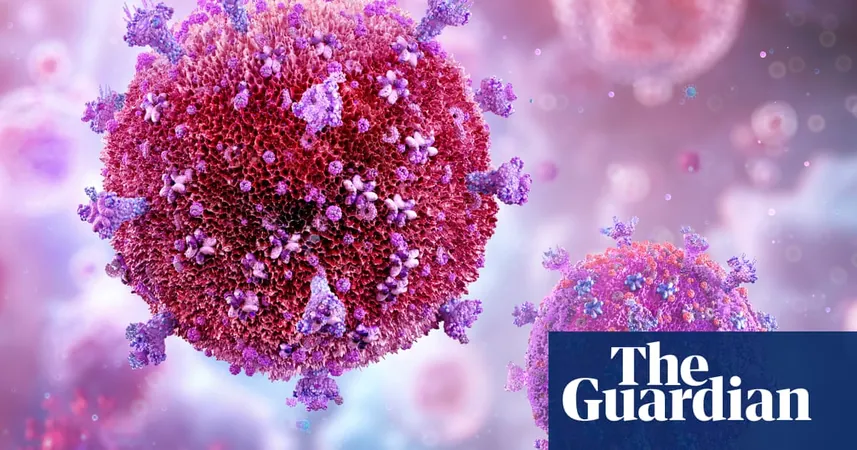
Game-Changer for DMD: Updated PJ Nicholoff Steroid Protocol Released!
2025-05-13
Author: Siti
Major Breakthrough in Duchenne Muscular Dystrophy (DMD) Care
Parent Project Muscular Dystrophy (PPMD), a crucial nonprofit organization striving to eradicate Duchenne muscular dystrophy (DMD), has just unveiled an updated version of the PJ Nicholoff Steroid Protocol. This marks a monumental milestone as it celebrates the 10th anniversary of its original launch.
Tailored Support for Healthcare Providers
The protocol, affectionately known as PJ’s Protocol, offers essential guidance for healthcare professionals regarding corticosteroid use in DMD patients, particularly during critical phases of physical stress, such as injuries or surgical procedures.
In partnership with Optimize DMD—a pioneering global consortium aimed at enhancing care, education, and research on endocrine and bone health for individuals with Duchenne—this revised edition encapsulates a decade's worth of clinical advancements, groundbreaking therapies, and enhanced safety protocols.
"At PPMD, our mission is to ensure every person with Duchenne receives exceptional care," stated Rachel Schrader, PPMD’s vice president of clinical care and education. "This substantial update reflects the swift evolution in approved therapies and the necessary advancements in clinical care. The protocol arms healthcare professionals and caregivers with the latest knowledge for securely managing patients through illness, injury, or significant changes in their steroid treatment."
Understanding Steroid Use in DMD
Steroids like prednisone, Emflaza (deflazacort), and Agamree (vamorolone) are vital for maintaining muscle function and minimizing inflammation in DMD. However, prolonged steroid use can increase the risk of adrenal insufficiency, where the body struggles to produce adequate cortisol, an essential hormone.
During stressful situations, such as illness or surgery, the body's demand for cortisol spikes, posing a severe risk of adrenal crisis for those with adrenal insufficiency. Symptoms may include extreme fatigue, dangerously low blood pressure, vomiting, and, in critical cases, shock.
The Legacy of PJ Nicholoff
The protocol honors Phillip James Nicholoff, who bravely lived with DMD and tragically passed away at age 31 following surgery for bone fractures. A review of his medical care revealed that he didn’t receive appropriate stress-dose steroids during his hospital stay, leading to post-surgical complications like respiratory distress and low blood pressure.
This protocol aims to standardize emergency steroid management by equipping healthcare professionals with evidence-based strategies to identify early signs of acute adrenal insufficiency and administer timely stress-dose steroids. It also offers guidelines for safely tapering or reducing corticosteroids to avoid withdrawal issues.
Key Concepts of the 2025 Protocol
The 2025 revised protocol highlights six key principles crucial for managing steroid use in DMD patients: 1. The risk of adrenal insufficiency for those on long-term steroid therapy; 2. The complex detection of adrenal insufficiency; 3. The necessity of stress dosing during moderate or severe physical stress; 4. Safe tapering methods when reducing or stopping steroid use; 5. The significance of stress-dose steroids during physiological stress for those on maintenance doses; 6. Additional precautions to mitigate adrenal insufficiency risks when switching between steroids.
"The PJ Nicholoff Protocol serves as a definitive guide for healthcare professionals to prevent adrenal insufficiency—an alarming potential side effect of corticosteroid therapy in those with Duchenne," explained Dr. Leanne Ward, a pediatric endocrinologist and co-founder of the Optimize DMD consortium.
"This 2025 edition, under the expert guidance of Dr. David Weber and Dr. Anne Marie Sbrocchi, provides critical updates, especially regarding the management of adrenal insufficiency for patients using the novel steroid Agamree. We extend our heartfelt gratitude to the Nicholoff family for their ongoing commitment to global efforts aimed at preventing adrenal insufficiency in those battling Duchenne muscular dystrophy."



 Brasil (PT)
Brasil (PT)
 Canada (EN)
Canada (EN)
 Chile (ES)
Chile (ES)
 Česko (CS)
Česko (CS)
 대한민국 (KO)
대한민국 (KO)
 España (ES)
España (ES)
 France (FR)
France (FR)
 Hong Kong (EN)
Hong Kong (EN)
 Italia (IT)
Italia (IT)
 日本 (JA)
日本 (JA)
 Magyarország (HU)
Magyarország (HU)
 Norge (NO)
Norge (NO)
 Polska (PL)
Polska (PL)
 Schweiz (DE)
Schweiz (DE)
 Singapore (EN)
Singapore (EN)
 Sverige (SV)
Sverige (SV)
 Suomi (FI)
Suomi (FI)
 Türkiye (TR)
Türkiye (TR)
 الإمارات العربية المتحدة (AR)
الإمارات العربية المتحدة (AR)